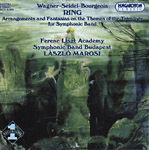Those of us who played in concert or symphonic band in high school or college most likely had the experience of playing Wagner band arrangements. Probably the most well known of modern transcriptions is “Elsa’s Procession to the Cathedral” from Lohengrin, but there also is an arrangement of the “Magic Fire Music” from Die Walküre in which the woodwinds do their best to imitate the cascading strings. A similar effect is aimed at here, aided by the harp, in Arthur Seidel’s (1849-1910) Gross Fantasie aus Die Walküre. Seidel, in fact, made band arrangements of Siegfried, Götterdämmerung and the “Entry of the Gods into Valhalla”. (Wagner himself approved of, and even assisted in making military band arrangements that were published in 1878.) Seidel’s technique is consistent throughout: beautiful brass sonorities straight from Wagner, the trumpet frequently taking the vocal line, while the rest is left to the woodwinds. The sound is so beguiling that we soon forget that this is just a wind band. Only in some of Wagner’s most ecstatically orchestrated passages, like Siegfried’s awakening of Brunnhilde, do we long for the strings.
U.S. Navy General John Bourgeois’ transcription of Prelude to Das Rheingold is in the same vein as Seidel’s work. The Franz Liszt Academy Symphonic Band Budapest dazzles us with virtuoso performances from every chair. László Marosi conducts these Ringlets in a flowing, energetic manner that some of today’s prominent Wagner conductors could learn from. Hungaroton’s sound is powerful and natural. [5/13/2000]
































